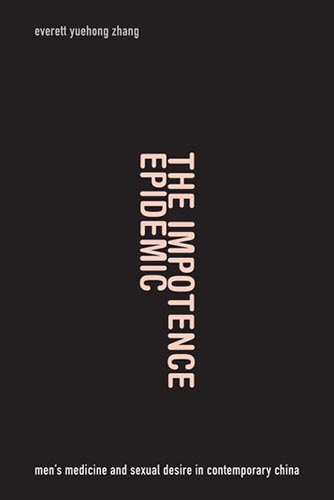I am very delighted to receive an honorable mention for the Diana Forsythe Prize from The General Anthropology Division of American Anthropological Association. I am very grateful.

I grew up in Maoist China and experienced the early period of post-Mao reform—its excitement as well as its big setbacks before I came to the US. Becoming an anthropologist and contributing to the understanding of this tremendous transformation are two undertakings closely related to each other. Neither is easy, but it was this combination that brought about the book now called The Impotence Epidemic.
Starting from the phenomenon—the increasing visibility of a seemingly infamous “epidemic,” I found myself drawn deeper and deeper into the relationship between body and society. When I was doing my fieldwork, many of my friends, former schoolmates, former colleagues and acquaintances in China were very surprised at this project, puzzled about my seriousness, and doubtful about its intellectual and academic value. That I was not able to suggest a cover image to the press in the final production of the book seemingly resonated with the difficulty in visualizing the relationship, even just barely suggestively, between the body of impotence and China’s transformation. The book designer at Duke University Press sent two cover designs to me and let me choose. I thought that potential readers were in a better position to decide. I showed the two choices to students of two courses I was teaching that semester (“Sexuality and Public Culture in East Asia,” an undergraduate course, and “Biopolitics in China and Beyond,” a graduate course). They voiced their choice almost unanimously. It seems to me that the cover image is a unique way to imagine that relationship, perhaps with a kind of smart tone of irony.
Working on this book drew me into traditional Chinese medicine in many ways, including re-experiencing many details in everyday life when I was growing up–smells, flavors, colors, and effects of herbs and decoctions of Chinese medicine. It brought about my memory of my grandmother who scooped up a bowl of soup drained from half-cooked rice for me to eat, because it was nourishing seminal essence. It also reminded me of my mother who asked me to drink a bitter herbal tea in the third fu days (the hottest period of summer in the city of Chongqing, one of the “three big stoves” along Yangtze River) in order to lower the heat of yang to maintain balance. It constantly retrieved my memories of getting to know the differences between yin food and yang food in vegetable markets and at dinner table. Those memories refreshed by my fieldwork encounters helped me a great deal in interviewing people from all walks of life. Two streams of life—details concerning rising and resting in everyday life on the one hand and interpretations of notions such as “embodiment” and “being-in-the-world” on the other hand—came out together vividly.
Chinese medicine tells the story of difference. When Viagra was invented and making waves around the world, I was not particularly surprised that it had a different initial reception in China. The first encounter between herbs and Viagra, two different types of technologies concerning bodies, offered me the opportunity to observe very interesting phenomena. They showed what difference the coming together of different medical technologies made in the globalized world.
Long before this book came out, I had started another project. Now, I am working on a book manuscript that compares two earthquakes in China—the 1976 earthquake that killed about 240,000 people and the 2008 earthquake that killed about 90,000 people—by showing how people, families, communities, society and the state coped, very differently, with these two disasters—their trauma, the grieving and mourning rituals, psychological intervention, reproductive governance, and the sense of and the struggle for social justice. It is a very different topic from The Impotence Epidemic, but, something persists.

1 Trackback